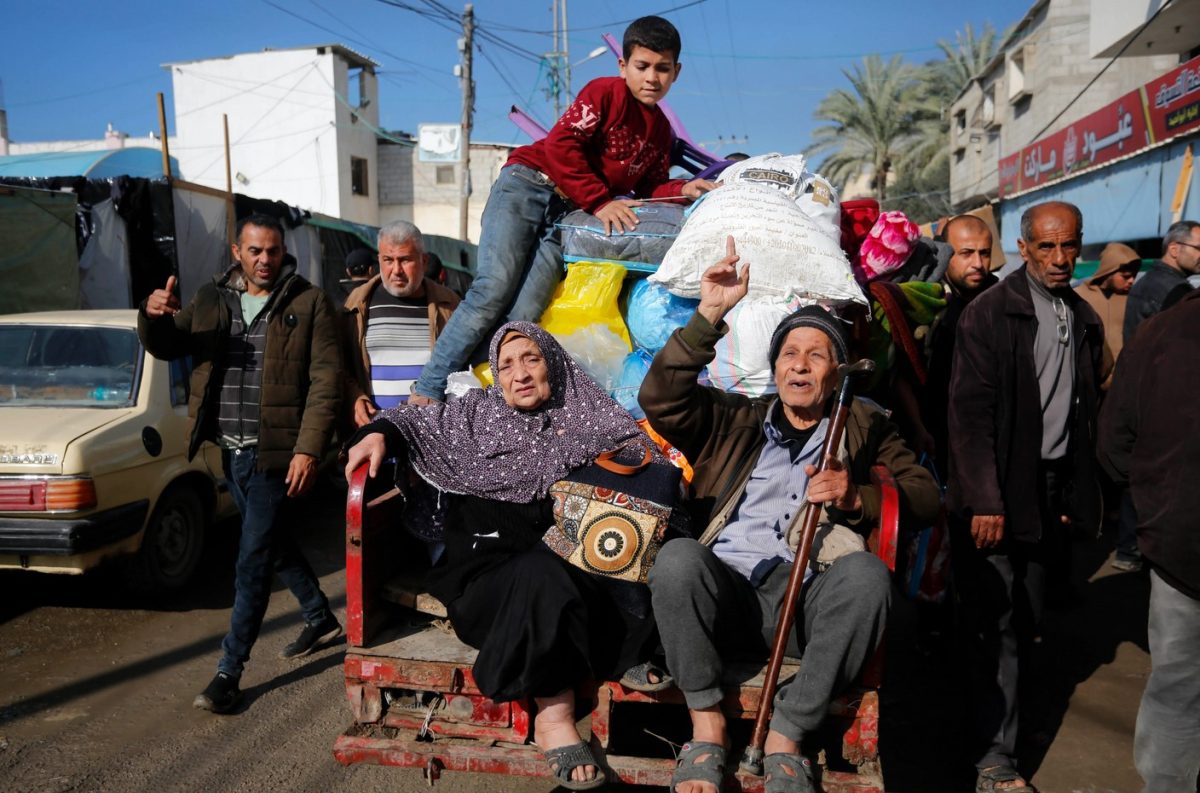The US-based group added it had collected evidence that suggested “the war crime of forcible transfer [of the civilian population]”, describing it as “a grave breach of the Geneva conventions and a crime under the Rome statute of the international criminal court”.
The report was published amid mounting evidence that Israel is accelerating its efforts to cut the Gaza Strip in two with a buffer zone and is building new infrastructure to support a prolonged military presence, with an increased pace of demolitions and destruction.
Residents in northern Gaza said Israeli forces were besieging displaced families and the remaining population, which some estimated at a few thousand, ordering them to head south through a checkpoint separating two towns and a refugee camp from Gaza City.
Men were held for questioning, while women and children were allowed to continue towards Gaza City, residents and Palestinian medics say.
Calling for Israel’s policy of forced displacement to be investigated by the international criminal court, Human Rights Watch also urged targeted sanctions against Israel including the cessation of arms sales.
The report by the prominent international rights group, titled ‘Hopeless, Starving, and Besieged’: Israel’s Forced Displacement of Palestinians in Gaza, takes aim at one of Israel’s most controversial policies: the use of evacuation orders, which have driven mass displacement inside Gaza, with many people being displaced on multiple occasions.
That has led to the displacement of more than 90% of the population – 1.9 million Palestinians – and the widespread destruction of much of Gaza over the last 13 months.
The HRW report is in stark contrast to the assessment by the US state department earlier this week that Israel had not breached American laws on blocking aid supplies after the lapse of a 30-day deadline it gave Israel to boost humanitarian aid access in Gaza or risk having some military assistance cut off.
The fourth Geneva convention stipulates that in territory occupied by a belligerent, displacement of civilians must only occur in exceptional circumstances for “imperative military reasons” or for the population’s security and requires safeguards and proper accommodation to receive displaced civilians. The UN’s guiding principles on internal displacement also state that, in all circumstances parties to conflict must “prevent and avoid conditions that might lead to displacement of persons”.
Despite those conditions, Israel has repeatedly used evacuation orders – in Lebanon as well as Gaza – to forcibly displace civilians even though that the evacuation orders have no legal status.
While Israeli leaders and the Israel Defense Forces have justified the use of the evacuation orders, arguing that their use demonstrates Israel’s adherence to protecting civilians in wartime, the group says that they have instead harmed Palestinians.
“Israel claims that the displacement of nearly all of Gaza’s population has been justified for the security of the population and for imperative military reasons, and it has taken the requisite steps to safeguard civilians,” added the report.
“Because Palestinian armed groups are fighting from among the civilian population, Israeli officials claim, the military has evacuated civilians to enable it to target fighters and destroy the groups’ infrastructure, such as tunnels while limiting harm to civilians, such that the mass displacements were lawful.”
“[But] rather than ensuring civilians’ security, military “evacuation orders” have caused grave harm,” the report finds.
“Demonstrably, Israel has not evacuated Palestinian civilians in Gaza for their security, as they have not been secure during evacuations or on arrival at designated safe zones. Nor has Israel convincingly claimed that it had a military imperative for forcing most Palestinian civilians from their homes,” it notes.
Under international law, Israel – as the occupying power in Gaza – is under a legal obligation to facilitate the return of displaced persons to their homes in areas where hostilities have ceased.
Instead, the reports say, Israel has “rendered large areas of Gaza uninhabitable” by carrying out demolitions, intentionally destroying or severely damaging civilian infrastructure, including schools and religious and cultural institutions, including after hostilities had largely ceased in an area.
HRW added that the permanent displacement of civilians to create military buffer zones within the Gaza Strip would also amount to ethnic cleansing.
Israel’s campaign in the north of Gaza, and the evacuation of tens of thousands of Palestinians from the area, have fuelled claims from Palestinians that it is clearing the area for use as a buffer zone and potentially for a return of Jewish settlers.
The Israeli military has denied any such intention, and Prime Minister Benjamin Netanyahu has claimed he does not want to reverse the 2005 withdrawal of settlers from Gaza. But hardliners in his government have talked openly about going back.
